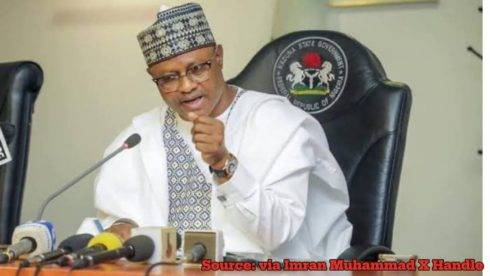Governor Uba Sani of Kaduna State revealed on Friday that the number of out-of-school children in his state has dropped by 300,000 since April 2024. This announcement came during a briefing with reporters at the State House following his meeting with President Bola Tinubu at the Aso Rock Villa in Abuja. Sani attributed this achievement to a strategic focus on enhancing the state’s educational infrastructure.
The reduction in out-of-school children reflects Kaduna’s commitment to addressing one of Nigeria’s pressing social challenges. With an initial estimate of 768,739 children not attending school, according to the Kaduna State Bureau of Statistics, this recent progress is seen as a step forward in the state’s battle against illiteracy and educational deprivation. The governor’s efforts underscore the importance of targeted interventions to ensure all children have access to quality education.
Infrastructure Development Key to Kaduna’s Educational Progress
Governor Uba Sani noted that infrastructure expansion has been crucial in reducing the number of out-of-school children. Over the past six months, his administration has constructed 62 new secondary schools and 2,340 classrooms in primary schools. This expansion aims to bridge the gap between the available educational facilities and the growing demand for basic education across the state.
The administration’s dedication to infrastructure development addresses classroom shortages and enhances the learning environment for students. By focusing on providing a conducive space for education, Kaduna is making strides toward ensuring that all children have a place in the classroom. This strategic approach aligns with broader state goals to elevate the quality and accessibility of public education.
Teacher Recruitment Drives Boost Education Sector in Kaduna
To complement the expansion of educational facilities, Governor Uba Sani’s administration has focused on increasing the number of qualified teachers. The governor shared that new teaching staff have been recruited to ensure that students receive quality instruction, supporting the state’s ambition to deliver a robust educational experience. This teacher recruitment drive is integral to the state’s strategy for effective and sustainable educational reform.
Expanding the workforce in the education sector ensures that newly established schools and classrooms are adequately staffed. With the growing number of students enrolling in public schools, an adequate teacher-to-student ratio is essential for fostering an environment conducive to learning. This emphasis on teacher recruitment is a critical component of Kaduna’s broader educational reform.
Healthcare Infrastructure Also Sees Improvements
In addition to educational development, Governor Uba Sani highlighted significant strides in Kaduna’s healthcare infrastructure. The administration has reconstructed, remodeled, and equipped 12 secondary healthcare centers across the state. These upgrades aim to increase access to quality healthcare for residents, supporting healthier communities and enabling children to remain in school rather than miss out due to health-related issues.
The governor’s healthcare initiatives reflect a holistic approach to improving social infrastructure in Kaduna. By strengthening healthcare services alongside education, the state is addressing two critical areas that directly impact the well-being and development of its citizens. The administration’s focus on these sectors demonstrates a commitment to creating a supportive environment for the next generation.
Cost-Cutting Measures Free Up Resources for Key Sectors
Governor Uba Sani’s administration has implemented cost-cutting measures to allocate more resources to education and healthcare. Uba Sani noted that, since assuming office, no new vehicles have been purchased for government officials, and allowances for commissioners and advisers have been reduced. Furthermore, the governor himself has been receiving half of his salary, underscoring his commitment to reducing government expenses.
These budgetary adjustments have enabled the Kaduna government to redirect funds toward critical areas like education and healthcare. The administration’s frugality exemplifies a growing trend among states striving for fiscal responsibility to prioritize investments in essential services. This efficient resource allocation is expected to continue fueling development efforts in Kaduna’s education and health sectors.
Kaduna’s Vision for Sustainable Development Through Accountability
Governor Uba Sani’s approach reflects a vision for sustainable growth rooted in accountability and resource optimization. By cutting non-essential expenses, the administration is channeling funds into areas that directly benefit the public, particularly education and healthcare. Uba Sani’s policies showcase an alternative governance model that emphasizes long-term societal gains over short-term administrative benefits.
This emphasis on sustainability and accountability sets a strong example for other states facing similar challenges. Governor Uba Sani’s approach, which prioritizes efficient use of resources, is designed to create lasting improvements in Kaduna’s infrastructure and public services. Through these reforms, Kaduna is positioning itself as a model for responsible governance that directly addresses the needs of its citizens.
Table of Contents
Discover more from OGM News NG
Subscribe to get the latest posts sent to your email.














